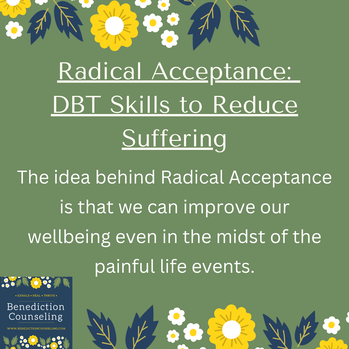Introducing Radical Acceptance Radical Acceptance is a core skill in Dialectical Behavior Therapy (DBT). This skill falls into the category of Distress Tolerance skills. We reach for this skill when we are navigating something big and hard in our life that is outside of our control or influence. The idea behind Radical Acceptance is that we can work to improve our wellbeing even in the midst of the big and hard things. To appreciate what Radical Acceptance can offer us, we must first understand the difference between pain and suffering. Pain is an inevitable part of being human in our world. We will all experience pain at different times in our life. Suffering, however, is caused when we make choices that make painful circumstances harder for ourselves. Radical Acceptance seeks to accept pain and reduce suffering. When we reduce suffering, we grow in emotional resilience and wellbeing. Understanding Radical Acceptance Radical Acceptance is the act of fully acknowledging and embracing reality without judgment or resistance. In other words, Radical Acceptance is a choice to stop fighting against reality. Likely something is happening in our life that is hard and beyond our ability to change it, and we are left with the decision to accept (radically) or reject the reality of the situation. The radical part of Radical Acceptance speaks to the complete and total nature of our choice to accept reality. Radical Acceptance is not resignation or apathy, rather it is a conscious choice to yield to what is real. Radical Acceptance also does not require our stamp of approval on the difficult circumstances, instead a simple acknowledgement that it exists and that we will stop fighting against it. Suffering comes when we fight against painful events that we don’t have the power to change, and Radical Acceptance offers us a peaceful alternative. Cultivating Radical Acceptance DBT offers us some step-by-step guidance on how to execute the choice to Radically Accept painful circumstances.
We can draw upon other DBT skills as tools to help us in this process. Mindfulness skills help us notice what is happening internally and externally and bring awareness to the present moment. Additionally, mindfulness skills call us to self-compassion and nonjudgmental observation of emotions. We may have an opportunity to reframe negative thoughts about our reality and notice growth opportunities or unexpected benefits. Some nourishing activities like journaling and spending time in nature can help promote acceptance. Often times, Radical Acceptance requires patience and practice, as most painful events will require us to choose acceptance over and over again. Disclaimer: Radical Acceptance is not an excuse for harmful or abusive dynamics, but it may be a starting point for being honest about the harm that exists. May this honesty open doors for healing and support.
0 Comments
Leave a Reply. |
Archives
July 2024
Categories
All
|

 RSS Feed
RSS Feed